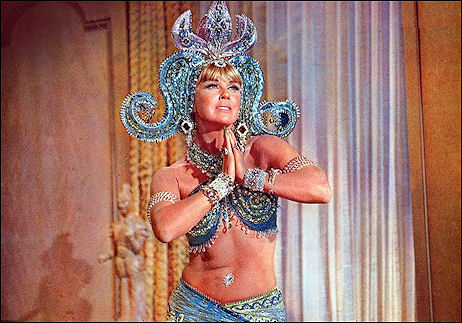I’ve been saying for years that it’s cool with me if the Motion Picture Academy wants to give Doris Day a Lifetime Achievement Oscar. She was fairly big during the ’40s and huge in the ’50s and early ’60s, and what she stood for — prim, old-fashoned, pure-of-heart virtue in a perky persona — was unmissable in its time and essential for any film scholar or historian to acknowledge today.

But to me Day’s aversion to any suggestion of real sexuality always seemed a bit curious and even weird. I always thought of her as a kind of Singing Nun or Virginal Funny Girl. The hard truth is that in any kind of real-world context, Day played willful, persistent and exceedingly strange women, especially from the early ’50s on. Try watching her labored performance in Alfred Hitchcock‘s 1955 version of The Man Who Knew Too Much without wincing. She was so into the Doris Day persona that she reportedly turned down the Mrs. Robinson role in The Graduate
In any event, despite pleas and exhortations by Douglas McGrath and Nellie McKay and Rex Reed and Liz Smith and other Day fans, the Academy never went for the idea. But the Los Angeles Film Critics Association announced today that it has. And that’s fine. Day is 87 and I presume in good health. But why has the Academy never stepped up to the plate and paid appropriate respect?
Day was very, very good in Pillow Talk and Lover Come Back, opposite Rock Hudson. She was also commendable in Young Man With A Horn and Love Me or Leave Me, and I remember something true and steady about her performance in Young At Heart, in which she played the love interest of a dark-hearted Frank Sinatra.
And yet it’s hard to think of another living veteran of ’50s and ’60s cinema who is more of an icon for uptight middle-class Truman-and-Eisenhower-era values and zero sexuality. I know I suddenly liked Day a lot more when I heard that rumor about her having had an affair with Sly Stone, but that turned out to be bogus. Day did apparently have a fling with L.A. Dodgers base-stealer Maury Wills.
My problem with Day mainly boils down to her performance in The Man Who Knew Too Much. Here’s how I put it last year: “I love aspects of this 1956 thriller (the murder in the Marrakech marketplace, the assassination attempt in Albert Hall) but Day’s grating emotionalism makes it a very hard film to watch. She cries, shrieks, trembles, weeps. And when she isn’t losing it, she’s acting pretentiously coy and smug in that patented manner of a 1950s Stepford housewife. Or she’s singing ‘Que Sera Sera’ over and over again.”









